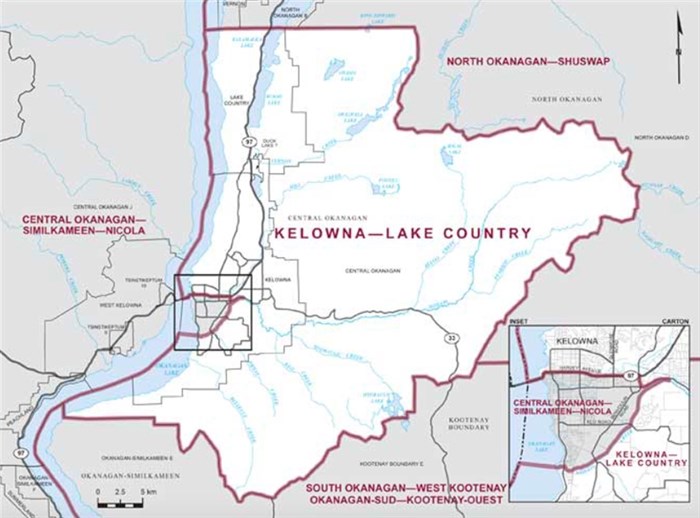
Kelowna-Lake Country federal candidates, clockwise from top left: Liberal Tim Krupa, Conservative Tracy Gray, NDP Cade Desjarlais, Green Imre Szeman and People's Party of Canada Brian Rogers.
Image Credit: SUBMITTED
September 06, 2021 - 6:00 PM
Kelowna-Lake Country may be the most interesting Okanagan race to watch in the upcoming federal election.
Not only was it held by Liberal Stephen Fuhr from 2015 to 2019 – the first time in 45 years it wasn’t Conservative, Reform or Alliance – but it’s a riding that has stirred a good deal of controversy.
Conservative MP Tracy Gray knocked Fuhr out of office in 2019 but she’s been getting a bit of a rough ride of late from Kelowna’s LGBTQ community for voting against a bill that would have banned conversion therapy. That bill died in the Senate when the election was called. Gray has been banned from Kelowna Pride events this year as organizers allege she’s not truly supportive of their community.
READ MORE: MP Tracy Gray lashes out after being banned from Kelowna Pride events
More recently, Liberal challenger Tim Krupa attacked Gray for not acknowledging the human-caused contributions to climate change and refusing to say whether she is vaccinated against COVID.
READ MORE: Campaign heats up between Conservative and Liberal candidates in Kelowna-Lake Country
Of course, Gray’s stand on LGBTQ issues, the climate and vaccines may be totally irrelevant to the outcome as federal elections are usually decided based on the party and there is a long history of voting Conservative in Kelowna-Lake Country.
“Federal campaigns, for a long time now, have been dominated by the national campaign, the national narrative, what people are seeing on their televisions or, increasingly, what they are seeing on social media and their perceptions of the leaders,” Hamish Telford, a political science professor at the University of the Fraser Valley, told iNFOnews.ca. “There are three variables here, the party, the leader and the local candidate and, I think, most people agree, the local candidate is usually the least significant.”
He sees Gray’s reluctance to make strong statements on things like climate change and vaccinations as a sign of trouble for the party under new leader Erin O’Toole.
“This is a pattern that repeats itself for a number of Conservative candidates,” Telford said. “O’Toole, in my view, is leading a party that doesn’t agree with much of what he says. He ran saying one thing to Conservatives to win the leadership of the party and he sort of jumped to the other side of the fence and is running on a completely different platform to win the election.”
For example, when Parliament dissolved, the majority of the Conservative caucus was pro-life, Telford said, while O’Toole is saying he’s pro-choice.
That presents problems if the Conservatives do form government.
“He will have the challenge of leading a party in which a large number of his caucus are skeptical of human rights for LGBTQ Canadians, want to introduce new laws to restrict abortions, skeptical of climate change science, skeptical of the pandemic science.”
The Liberals, on the other hand, aren’t trying very hard to win the riding back, pulling in Tim Krupa, a former Kelowna resident who has been living away since, at least, 2014.
“It’s extraordinarily difficult for parties to recruit viable candidates in ridings that are perceived to be a stronghold for another party,” Telford said. “The candidate who has been parachuted in this time, I’m guessing, does not have any expectations of winning this riding but he may have ambitions to run for the Liberals in another winnable riding in the future and he is earning points with the party for being a sacrificial lamb in this election.”
Krupa grew up in Kelowna and is proud to call it home but has refused to say how long he's been back in Kelowna from Toronto, where he works for CPP Investments.
Are you in this riding?
Kelowna-Lake Country is mostly made up of the District Municipality of Lake Country, Duck Lake Indian Reserve No. 7 and most of Kelowna.
The exception is the finger of Central Okanagan-Similkameen-Nicola that sticks into the city from Harvey Avenue/Highway 97 down to Mission Creek. The finger runs along the highway as far as Dilworth Drive, then cuts over to Springfield Road, out to Ziprick Road then to Mission Creek.

Map of the Kelowna-Lake Country federal riding.
Image Credit: Submitted/Elections Canada
Who are you?
The make-up of this city has changed over time, but its history and the way it was settled has affected the way people vote. The first wave of settlers to the valley was from conservative strongholds like Great Britain, Germany and Holland.
These people were conservative in terms of their values and they gave way to politically right-wing powerhouses like W.A.C. and Bill Bennett in provincial politics of the past, Telford said.
W.A.C., a hardware merchant from Kelowna, was elected B.C.’s premier in 1952 and held the role for 20 years, earning votes by paving roads and building bridges.
Bill became premier in 1979 and implemented the “restraint” program which was aimed at unburdening businesses from government spending on social services.
Their free-market economy approach to politics was a departure from what was happening in eastern provinces and set this region on its political path.
“That history has its legacy with how people are politically socialized,” Telford said. “The Okanagan also has a lot of retirees and older people are more conservative than younger people.”
Changes
While the city isn't known for its multiculturalism, there are changes afoot with a growing ethnic diversity being shown in the 2016 Census. Around six per cent of the population belongs to a visible minority, with South Asians accounting for the largest proportion of that number. About 3.4 per cent of the population is First Nations.
There is an increasing number of young people. The Central Okanagan Economic Development Commission tracks demographic changes and has shown from 2006 to 2016 the Central Okanagan had population increases in most age categories, with youth and young adult population growth surpassing the provincial and national average.
“While the region remains popular with retirees, it is interesting to note above-average growth in the 25 to 34 years as young professionals and families are drawn to the region’s career opportunities and relative lifestyle affordability,” reads the commission’s 2018 report.
2019 Election Results
Conservative Tracy Gray unseated Liberal Stephen Fuhr with 45.6 per cent of the vote to Fuhr’s 32.7 per cent.
The NDP’s Justin Kulik gained 12.1 per cent of the vote for third place with Travis Ashley of the Green Party picking up 7.5 per cent.
The rest of the field, combined, only collected about two per cent of the vote. In descending order they were John Barr of the People’s Party of Canada and two independents, Daniel Joseph and Silverado Socrates.
While 67 per cent of eligible voters turned out nationally in 2019, Kelowna-Lake Country beat that at 68.4 per cent.
Issues
“Basically from Kelowna to Winnipeg, you’re pretty safe Conservative country,” Telford said. That, combined with the aforementioned focus on the national leaders means local issues don’t amount to much here.
“If the campaign had gone the way the Liberals had wanted it to, perhaps, with all the forest fires that have plagued the Interior of B.C. and the Okanagan in particular, a Liberal campaign focused on climate change may have helped in Kelowna,” Telford said. “Surprisingly to me, the Liberals who called this election have run a very unfocused campaign. I don’t think it’s game over for them yet but I don’t think there’s any chance of them turning fortunes in the Okanagan.”
With the high cost of housing in Kelowna, that could have been a factor as well. But, it seems, there are a lot of retirees and incomers from other areas who don’t have a problem paying those rates.
Krupa has tried to make climate change and vaccination an issue and the LGBTQ community is still on the attack but that seems to carry little weight.
Likely Outcome
Canada 338 does regular projections of election outcomes.
As of Aug. 31, it projects 140 seats for the Liberals and 139 for the Conservatives out of 338 seats, so 170 are needed for a majority.
For Kelowna Lake-Country, it does predict that it will “likely” go to the Conservatives, which is not as strong a rating as the "Conservative Safe" rankings for the North Okanagan and Kamloops ridings.
CANDIDATES
Conservative Party of Canada – Tracy Gray
Gray served one term, from 2014 to 2018, as a Kelowna city councillor before running for and winning the Conservative nomination in 2019 against Renee Merrifield.
While Gray won the nomination federally, Merrifield was picked by the B.C. Liberals to run in Kelowna-Mission in the 2020 provincial election, easily winning. She was appointed to the key position of Health Critic and is now running for the leadership of the party.
When the election was called, Gray was her party’s critic for Export Promotion and International Trade and served on the Standing Committee on International Trade.
Prior to politics she was in the “beverage” industry and founded and owned Discover Wines VQA Wine Stores.
Green - Imre Szeman
Imre Szeman is a Research Professor of Environmental Communication at the University of Waterloo and serves as the Green Party’s critic for climate change.
He’s originally from Calgary.
“Imre’s research explores the social changes needed to support a transition to sustainable forms of energy,” his biography states.
He has written and edited 25 books and was appointment to the Royal Society of Canada last year.
His biography says he has a small B.C. homestead and divides his time between the B.C. Interior and Southern Ontario.
Liberal - Tim Krupa
Tim Krupa grew up in Kelowna and graduated from UBCO as valedictorian. He went on to school in Oxford and spent three years, from 2014 to 2017, as a policy advisor in Justin Trudeau’s office. He currently works at CPP Investments in Toronto.
“Tim will fight to help build back our local economy, create good jobs, and combat climate change,” his biography states. “As we finish the fight against COVID-19, he will advocate to make housing more affordable, support agriculture, protect the health of those most vulnerable, and defend and celebrate the incredible diversity of our vibrant community.”
NDP - Cade Desjarlais
Cade Desjarlais a political science major starting his second year at UBCO. He was born in Kelowna and has lived in the riding for the last 19 years.
He has worked in the restaurant and hospitality industries.
“He has an extensive background in community involvement, social justice, and leadership,” the biography supplied by the party reads.
He’s the youngest sitting member of the UBCO Student Union’s board of directors, which follows on years of being involved in student government in school.
“A passion of Cade’s is advocating for accessible mental health resources, working on the Youth Action Advisory Council at the Foundry, with the Canadian Mental Health Association, as well as Bell Let’s Talk,” the bio states.
People’s Party of Canada - Brian Rogers
There is very little information available on Brian Rogers.
The party’s website says he’s lived in the Okanagan Valley since the early 1970’s, that he worked for Western Star Trucks for 25 years until it was sold then became a journeyman electrician.
To contact a reporter for this story, email Rob Munro or call 250-808-0143 or email the editor. You can also submit photos, videos or news tips to the newsroom and be entered to win a monthly prize draw.
We welcome your comments and opinions on our stories but play nice. We won't censor or delete comments unless they contain off-topic statements or links, unnecessary vulgarity, false facts, spam or obviously fake profiles. If you have any concerns about what you see in comments, email the editor in the link above.
News from © iNFOnews, 2021